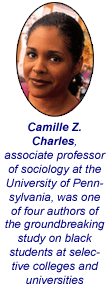University of Chicago Receives $100 Million Donation to Fund Scholarship Grants for Low-Income Students
 The University of Chicago’s Collegiate Scholars program enrolls 60 high school students from the predominantly black Chicago public school system. These students complete a three-year academic preparation course during the school year and over the summer months. Five students each year who successfully complete the Collegiate Scholars program are eligible for full-tuition scholarships at the University of Chicago. This and other outreach efforts have enabled the University of Chicago to increase black enrollments in recent years. This past academic year there were 81 black freshmen at the University of Chicago. This was an increase of more than 52 percent from a year earlier. The University of Chicago’s Collegiate Scholars program enrolls 60 high school students from the predominantly black Chicago public school system. These students complete a three-year academic preparation course during the school year and over the summer months. Five students each year who successfully complete the Collegiate Scholars program are eligible for full-tuition scholarships at the University of Chicago. This and other outreach efforts have enabled the University of Chicago to increase black enrollments in recent years. This past academic year there were 81 black freshmen at the University of Chicago. This was an increase of more than 52 percent from a year earlier.
Now an unidentified donor has given the University of Chicago a $100 million gift which is earmarked for full-tuition scholarships for low-income students. The gift, from an alumnus who graduated in the early 1980s, is the largest cash gift to an educational institution in Illinois history.
The gift will enable the University of Chicago to eliminate student loans for all students from families whose incomes are under $60,000. Students from families with incomes between $60,000 and $75,000 will have about one half of their loan amounts replaced with scholarship grants.
The new scholarship grants will undoubtedly increase the University of Chicago’s ability to attract more low-income black students.
  |
“There is no reason why you can’t get your black student graduation numbers to look identical to your numbers for white students.”
— Kenneth Warren, deputy provost for research and minority issues at the University of Chicago, in U.S. News & World Report, June 4, 2007
|
Déjà Vu All Over Again: Harvard Loses Another Top Black Scholar to Stanford
 Caroline M. Hoxby, an African-American economist, is leaving Harvard University for Stanford University. Hoxby decided to make the move to Stanford after Harvard denied tenure to her husband Blair Hoxby, a noted scholar of the theater during the Renaissance period. Caroline M. Hoxby, an African-American economist, is leaving Harvard University for Stanford University. Hoxby decided to make the move to Stanford after Harvard denied tenure to her husband Blair Hoxby, a noted scholar of the theater during the Renaissance period.
Stanford offered both Hoxbys tenured positions. Hoxby, and several other scholars at Harvard, said that the university did very little to try to keep her from leaving.
Hoxby has served on the Harvard faculty since 1994. In 2001 she was named the Allie S. Freed Professor of Economics. An expert on the economics of education and a proponent of school choice, Professor Hoxby has stellar academic credentials. She is a summa cum laude graduate of Harvard College. She holds a master’s degree in economics from Oxford University, where she was a Rhodes Scholar. She returned to the United States to win a Ph.D. from MIT. She was consistently rated as one of the students’ favorite teachers at Harvard.
The coup for Stanford is reminiscent of a similar feat that it pulled off three years ago. After Harvard denied a tenured position to Marcyliena Morgan, she and her husband, the esteemed sociologist Lawrence Bobo, were both offered, and they accepted, tenured posts at Stanford. Now Harvard has authorized a tenured position to Professor Morgan and is trying to recruit the couple to return to Cambridge.
Nine African-American College Students Win Teaching Fellowships
 The Rockefeller Brothers Fund has announced its list of 25 recipients of the 2007 Fellowships for Aspiring Teachers of Color. All of the fellows have just completed their junior year of college. Students who are elected fellows participate in a summer project this year which involves direct teaching experience. Fellows must agree to teach in the public schools for three years after they graduate from college. Each fellow receives $22,100 over a five-year period. The Rockefeller Brothers Fund has announced its list of 25 recipients of the 2007 Fellowships for Aspiring Teachers of Color. All of the fellows have just completed their junior year of college. Students who are elected fellows participate in a summer project this year which involves direct teaching experience. Fellows must agree to teach in the public schools for three years after they graduate from college. Each fellow receives $22,100 over a five-year period.
Nine of this year’s recipients are African Americans. Here are this year’s African-American winners and the colleges at which they are enrolled.
• Shayla Adams (Wellesley College)
• Nicole Golden (Howard University)
• Bianca Baird (Spelman College)
• Ayesha Jeter (Howard University)
• Thalia Ann Bethel (Pace University)
• Brence Pernell (Duke University)
• Corvena Francis (City College of N.Y.)
• Kisha Woods (Spelman College)
• Jodi Gajadar (Williams College)
The Higher Education of South Carolina’s New Black Supreme Court Justice
 In late May, Donald Beatty became the third African American in state history to sit on the Supreme Court of South Carolina. He was elected on the third ballot in a vote by South Carolina state legislators. Beatty, now 55 years old, will be the first black justice on the court since the retirement of Ernest Finney Jr. in 2000. Finney served on the court for 15 years. The only other black member of the South Carolina Supreme Court was Jonathan Jasper Wright, who served during the Reconstruction era. In late May, Donald Beatty became the third African American in state history to sit on the Supreme Court of South Carolina. He was elected on the third ballot in a vote by South Carolina state legislators. Beatty, now 55 years old, will be the first black justice on the court since the retirement of Ernest Finney Jr. in 2000. Finney served on the court for 15 years. The only other black member of the South Carolina Supreme Court was Jonathan Jasper Wright, who served during the Reconstruction era.
Donald Beatty is a 1974 graduate of South Carolina State University, the historically black educational institution in Orangeburg. He earned his law degree at the University of South Carolina. Beatty has served on the South Carolina Court of Appeals since 2003. Previously, he was a circuit judge and a Democratic member of the South Carolina House of Representatives.
Historically Black Universities Developing Ties With Educational Institutions in China
 Tennessee State University, the historically black educational institution in Nashville, is planning to expand its MBA program in a cooperative effort with Tianjin Polytechnic University in China. There are very few Chinese trained in business management, and with China’s growing economy there is a strong need for more training. Tennessee State hopes to enroll 20 to 30 students in an MBA program on the Chinese campus next year. Tennessee State University, the historically black educational institution in Nashville, is planning to expand its MBA program in a cooperative effort with Tianjin Polytechnic University in China. There are very few Chinese trained in business management, and with China’s growing economy there is a strong need for more training. Tennessee State hopes to enroll 20 to 30 students in an MBA program on the Chinese campus next year.
North Carolina Central University plans to start a distance education program in speech therapy to English-speaking students in China. The program will be run by faculty members in NCCU’s communication disorders department. There is a pressing need for speech therapists in China. There are only 500 speech therapists in the entire nation of China, a country with over a billion people. In comparison, there are 1,500 speech therapists in the state of North Carolina, which has a population of 9 million.
Antioch College to Close Its Doors: Educational Institution Had a Long History of Enrolling African Americans
 Antioch College in Yellow Springs, Ohio, was founded in 1852. Its first president was Horace Mann, a renowned abolitionist. African-American students were admitted to the college prior to the onset of the Civil War. In 1862 the trustees of the college approved a radical resolution which stated, “Antioch College cannot, according to the charter, reject persons on account of color.” Coretta Scott King and Eleanor Holmes Norton are among Antioch’s most noted black graduates. Antioch College in Yellow Springs, Ohio, was founded in 1852. Its first president was Horace Mann, a renowned abolitionist. African-American students were admitted to the college prior to the onset of the Civil War. In 1862 the trustees of the college approved a radical resolution which stated, “Antioch College cannot, according to the charter, reject persons on account of color.” Coretta Scott King and Eleanor Holmes Norton are among Antioch’s most noted black graduates.
Throughout its history the college has been plagued by financial difficulties. On several occasions Antioch closed its doors in order to reorganize and raise more money to continue operations. This past week the college’s board of trustees voted to close the college once again on July 1, 2008. Enrollments have dropped from a high of 2,000 to 400 this past academic year. Blacks were 3.1 percent of the total enrollment.
Buildings on the Antioch campus are run-down and in need of repair and the college’s $35 million endowment provides little investment income for major improvement projects. The college hopes to raise money so it can open again in 2012.

GALLAUDET UNIVERSITY

Tenure Track, Department of Chemistry
Gallaudet University serves deaf, hard of hearing, and hearing students from many different backgrounds and seeks to develop a workforce that reflects the diversity of its student body. Gallaudet is an equal employment opportunity/affirmative action employer and actively encourages deaf, hard of hearing, members of traditionally underrepresented groups, people with disabilities, women, and veterans to apply for open positions.
For detailed job descriptions, go to:
http://academicaffairs.gallaudet.edu/jobs
Send letter of application, vitae, official graduate transcripts, and three letters of recommendation to:
GALLAUDET UNIVERSITY
Office of the CLAST Dean/Attn: R. Hogan
Hall Memorial Bldg., E150
800 Florida Ave., NE
Washington, DC 20002-3695

Earl Yarbrough Named President of Savannah State University
 The Georgia state board of regents has named Earl G. Yarbrough Sr. as the twelfth president of Savannah State University. He was a professor of engineering at Virginia State University and had previously served as the university’s provost. Yarbrough had been named president-elect of Knoxville College in Tennessee, but funding had not been arranged to pay his salary. As a result, the Knoxville College board agreed to terminate its contract with Dr. Yarbrough so that he could assume the Savannah State presidency. The Georgia state board of regents has named Earl G. Yarbrough Sr. as the twelfth president of Savannah State University. He was a professor of engineering at Virginia State University and had previously served as the university’s provost. Yarbrough had been named president-elect of Knoxville College in Tennessee, but funding had not been arranged to pay his salary. As a result, the Knoxville College board agreed to terminate its contract with Dr. Yarbrough so that he could assume the Savannah State presidency.
Yarbrough is a graduate of Wichita State University in Kansas. He holds a master’s degree in industrial studies from California State University at Los Angeles and a doctorate in industrial education from Iowa State University.
Dartmouth College Graduates Its First Triplets

For the first time in the school’s 238-year history, this June Dartmouth College graduated its first set of triplets. The three graduates are African-American sisters from San Diego, California.
Ashley, Brittany, and Courtney Henry, age 21, are identical triplets. They are graduates of a Seventh Day Adventist school in California where they shared honors as valedictorians.
All three girls will return to San Diego and take a year off before beginning professional school. Ashley, a history major, is going to medical school. Brittany, who majored in religion at Dartmouth, will enter law school. Courtney graduated from Dartmouth with a degree in American history. She plans on a career in dentistry.
Appointments
 • Lawrence B. Harkless was named founding dean of the College of Podiatric Medicine at the Western University of Health Sciences in Pomona, California. The new college of podiatry is expected to open in 2009. • Lawrence B. Harkless was named founding dean of the College of Podiatric Medicine at the Western University of Health Sciences in Pomona, California. The new college of podiatry is expected to open in 2009.
Dr. Harkless is Louis T. Bogy Professor of Podiatric Medicine and Surgery at the University of Texas Health Science Center in San Antonio. He is a graduate of the California College of Podiatric Medicine in San Francisco.
 • V. Kofi Agawu is returning to a full professorship of music at Princeton University. He has served for one year as the Walter Bigelow Rosen Professor of Music and professor of African and African American studies. Previously, he taught at Princeton from 1998 to 2006. • V. Kofi Agawu is returning to a full professorship of music at Princeton University. He has served for one year as the Walter Bigelow Rosen Professor of Music and professor of African and African American studies. Previously, he taught at Princeton from 1998 to 2006.
Agawu is a native of Ghana. He is a graduate of Reading University in the United Kingdom and holds a master’s degree from King’s College London and a Ph.D. in music from Stanford University.
 • Maurice Apprey, a professor of psychiatric medicine at the University of Virginia, was named dean of the university’s Office of African-American Affairs. Dr. Apprey has served on the University of Virginia faculty since 1980. • Maurice Apprey, a professor of psychiatric medicine at the University of Virginia, was named dean of the university’s Office of African-American Affairs. Dr. Apprey has served on the University of Virginia faculty since 1980.
A graduate of the College of Emporia in Kansas, he holds two Ph.D.s, one from the Saybrook Institute and Research Center in San Francisco, and the other from the Weatherhead School of Management at Case Western Reserve University in Cleveland.
 • Sharon Nyota Tucker, an associate professor of political science at Albany State University, was named legal counsel for the university. A graduate of Howard University, Tucker was the first African-American woman to earn a law degree at the University of Georgia. She has been on the faculty at Albany State University for the past 26 years. • Sharon Nyota Tucker, an associate professor of political science at Albany State University, was named legal counsel for the university. A graduate of Howard University, Tucker was the first African-American woman to earn a law degree at the University of Georgia. She has been on the faculty at Albany State University for the past 26 years.
• Garnesha Beck was named director of the AmeriCorps VISTA service at the University of Texas at Tyler. Beck is a graduate of Grambling State University in Louisiana and holds an MBA from the University of Dallas.
|
The Socioeconomic Background of Black Students at Selective Colleges
 A study authored by Professors Douglas S. Massey, Margarita Mooney, and Kimberly C. Torres of Princeton University and Camille Z. Charles of the University of Pennsylvania, which appears in a recent edition of the American Journal of Education, has analyzed the family backgrounds of the black students who enrolled at 28 selective colleges and universities. The results showed that the vast majority of black students at these selective colleges are not from low-income, inner-city, or rural black belt families. In fact, for native-born black students at these 28 selective colleges and universities, a remarkable 55.2 percent of their fathers are college graduates and 25 percent of their fathers hold a graduate degree. Fifty-seven percent of these students at selective colleges have mothers who had completed college and 26 percent have mothers who hold a graduate degree. These percentages are about triple the national average for all African Americans. A study authored by Professors Douglas S. Massey, Margarita Mooney, and Kimberly C. Torres of Princeton University and Camille Z. Charles of the University of Pennsylvania, which appears in a recent edition of the American Journal of Education, has analyzed the family backgrounds of the black students who enrolled at 28 selective colleges and universities. The results showed that the vast majority of black students at these selective colleges are not from low-income, inner-city, or rural black belt families. In fact, for native-born black students at these 28 selective colleges and universities, a remarkable 55.2 percent of their fathers are college graduates and 25 percent of their fathers hold a graduate degree. Fifty-seven percent of these students at selective colleges have mothers who had completed college and 26 percent have mothers who hold a graduate degree. These percentages are about triple the national average for all African Americans.
Furthermore, for native-born black students at these 28 selective institutions, 74 percent owned their home compared to less than half of all black families nationwide. The median value of the homes of these black students was nearly $200,000.
More than one quarter of the native-born black students at these selective colleges and universities come from families with annual incomes over $100,000. Nationwide, only 7 percent of all black households have incomes of more than $100,000.
Twenty-seven percent of the black students at these selective colleges and universities were graduates of private high schools. This is a level very similar to that of white students at these selective colleges and universities.
University Researchers Find No Link Between the Use of Hair Relaxers and the Incidence of Breast Cancer in Black Women
 Numerous studies have shown breast cancer is more common among African-American women below the age of 40 compared to white women of the same age. And black women are more likely than white women to die from the disease. The increased risk has not been fully explained by genetic or environmental factors. Numerous studies have shown breast cancer is more common among African-American women below the age of 40 compared to white women of the same age. And black women are more likely than white women to die from the disease. The increased risk has not been fully explained by genetic or environmental factors.
Researchers at Boston University and the Howard University Cancer Center recently completed a study to determine if the increased use of chemicals in hair relaxers commonly used by African-American women could explain the differences in breast cancer rates.
Chemicals in hair relaxers can enter the body through lesions or small cuts in the scalp. And these products are not closely monitored by the Food and Drug Administration, so black women may come in contact with potentially harmful substances.
But the research conducted over a 20-year period found that black women who use hair relaxers frequently (seven or more times a year) are no more likely to develop breast cancer than other black women. Also, black women who used hair relaxers over a long period were not any more likely to develop breast cancer than other black women.
The study, funded by the National Cancer Institute, was published in the May issue of Cancer Epidemiology, Biomarkers & Prevention.
Prairie View A&M Graduate on an 1,800-Mile Trek to Help the Homeless
 Noah Rattler, an engineering graduate of Prairie View A&M University, the historically black educational institution in Texas, has embarked on an 1,800-mile trek across the Southwest to raise awareness about the plight of the homeless. Rattler is walking from Houston to Los Angeles. His goal is to walk 20 miles each day. Noah Rattler, an engineering graduate of Prairie View A&M University, the historically black educational institution in Texas, has embarked on an 1,800-mile trek across the Southwest to raise awareness about the plight of the homeless. Rattler is walking from Houston to Los Angeles. His goal is to walk 20 miles each day.
Rattler will make stops along the way to solicit donations for SEARCH, a Houston-based nonprofit agency for the homeless. He also is meeting with politicians and visiting homeless shelters along his route.
You can follow the progress of Rattler’s walk or make an online donation to help him raise money for the homeless by clicking here.

EASTERN UNIVERSITY

Associate Professor/Professor of Urban Studies
Urban Studies: Associate Professor/Professor of Urban Studies to begin January 2008 to teach courses in the Masters of Arts in Urban Studies program, as well as serve as Program Coordinator for the Community Development concentration.
Applicant must be a scholar-practitioner with experience, publication in community development and interdisciplinary urban studies, and have administrative experience. Doctorate required in Urban Studies, Community Development, Sociology or a related field. Eastern University is a Christian University committed to promoting positive social change, and successful candidates must have a religious commitment compatible with the Christian mission of the university.
For more details click here.

New Internship Program for Black College Students Seeks to Increase Number of African Americans Pursuing Careers in the Securities Industry
 According to the Securities Industry Association, 2 percent of the retail securities brokers in the United States are black. Furthermore, African Americans make up only 3 percent of the total securities sales force at firms across the United States. According to the Securities Industry Association, 2 percent of the retail securities brokers in the United States are black. Furthermore, African Americans make up only 3 percent of the total securities sales force at firms across the United States.
In an effort to increase the number of African Americans pursuing careers in the securities industry, the Money Management Institute, in conjunction with the National Association for the Advancement of Colored People, has launched the Gateway to Leadership program.
Under the new program, 19 undergraduate students from historically black colleges and universities are currently employed for the summer as interns at investment firms such as Goldman Sachs, A.G. Edwards, Prudential Financial, and Charles Schwab. Toward the end of the internship, the 19 students will be competing in a case study project where they will be able to showcase the skills they have developed. All students will meet in New York City in early August where the winners of the competition will be announced.
Students selected for the program are paid a weekly stipend. Housing and transportation costs are also provided.
Successful Strategies to Increase Retention of Low-Income College Students
 A new report from the Pell Institute for the Study of Opportunity in Higher Education examines practices undertaken by public universities that have been successful in retaining and graduating low-income students. This is of particular importance to African Americans because blacks make up a disproportionately large share of all low-income college students in this country. More than one quarter of all students who receive federal Pell Grants are black. These grants are restricted to families with low incomes. A new report from the Pell Institute for the Study of Opportunity in Higher Education examines practices undertaken by public universities that have been successful in retaining and graduating low-income students. This is of particular importance to African Americans because blacks make up a disproportionately large share of all low-income college students in this country. More than one quarter of all students who receive federal Pell Grants are black. These grants are restricted to families with low incomes.
The Pell Institute examined retention procedures at 14 large state universities that were rated as moderately selective in their admissions procedures. The survey found that 10 of these 14 institutions graduated low-income students at a high rate. They then searched for practices and procedures that these high-performing institutions shared which would help explain their success in graduating low-income students. Among the factors common to all high-performing universities were:
• The designation of faculty advisers or mentors who are charged with helping individual students navigate through their college careers.
• A high level of student involvement in campus activities.
• Specific programs such as freshman orientation, freshman interest groups, and freshman seminars in which student participation is mandatory.
• Concerted efforts to improve instruction in low-level introductory courses.
• Striving to keep class sizes down.
• Early warning systems to identify students who are at risk of dropping out.
• Academic support services to help students who are struggling to keep up and social support services to help students with nonacademic problems.
Snail-Like Progress in Increasing Black Head Coaches in College Sports
 A new report from the National Collegiate Athletic Association shows that African Americans have made only snail-like progress in coaching positions in college sports over the past decade. The data shows that in head coaching positions, the black percentage of all coaches for men’s teams increased from 7.6 percent in 1996 to 8.8 percent in 2006. For women’s teams, the percentage of blacks as head coaches increased from 7.5 percent to 8.5 percent over the same period. A new report from the National Collegiate Athletic Association shows that African Americans have made only snail-like progress in coaching positions in college sports over the past decade. The data shows that in head coaching positions, the black percentage of all coaches for men’s teams increased from 7.6 percent in 1996 to 8.8 percent in 2006. For women’s teams, the percentage of blacks as head coaches increased from 7.5 percent to 8.5 percent over the same period.
The figures vary to a great degree depending on the particular sport. In 2006 blacks made up more than 17 percent of the head coaches in track and field and men’s basketball, sports with very large numbers of black athletes. But blacks were less than 3 percent of the head coaches in men’s and women’s lacrosse, men’s swimming, field hockey, ice hockey, women’s golf, and wrestling. All of these sports have very few black athletes.
Substantial progress was made over the past decade in adding black head coaches in both indoor and outdoor track for men and women. But in almost every other college sport, the progress was minimal at best. In six sports the percentage of black head coaches actually declined in the 1996-2006 period. They are baseball, women’s tennis, women’s golf, men’s tennis, wrestling, and softball. In both 1996 and 2006 there were no black head coaches in college ice hockey.
  |
16.9% Black percentage of all students in public schools in the United States in 2005.
31.3% Black percentage of all students in public charter schools in the United States in 2005.
source: U.S. Department of Education
|
LeMoyne-Owen College Gets Cash Infusion From the City of Memphis
 The Memphis city council voted 9-2 to award historically black LeMoyne-Owen College a cash infusion of $3 million. The college maintains that it needs at least $3 million by the end of this month in order to pay its bills. The city will give the college $1 million in each of the next three years. The Memphis city council voted 9-2 to award historically black LeMoyne-Owen College a cash infusion of $3 million. The college maintains that it needs at least $3 million by the end of this month in order to pay its bills. The city will give the college $1 million in each of the next three years.
The college hopes to leverage the city’s gift to get similar pledges from the county and state governments. The college previously announced that area churches had pledged to contribute $500,000 in each of the next three years. Cummins Inc., the diesel engine manufacturer, pledged another $500,000.
Grants
 • The Bank of America Charitable Foundation has donated $300,000 to the Negro Leagues Baseball Museum in Kansas City. The donation will be used to fund a three-year tour of historically black colleges and universities of the museum’s “Discover Greatness” exhibit. It is estimated that 40 percent of the players in the Negro leagues attended a black college or university. • The Bank of America Charitable Foundation has donated $300,000 to the Negro Leagues Baseball Museum in Kansas City. The donation will be used to fund a three-year tour of historically black colleges and universities of the museum’s “Discover Greatness” exhibit. It is estimated that 40 percent of the players in the Negro leagues attended a black college or university.
The exhibit includes 90 photographs, team pennants, and players uniforms as well as a video presentation chronicling the history of the Negro leagues. The exhibit will be showcased at Alabama State University in Montgomery in August and September and then it will move to Florida Memorial University in Miami Gardens.
 • Virginia State University, the historically black educational institution in Petersburg, received a $391,311 grant from the U.S. Department of Education for the university’s Upward Bound program. The program provides academic and guidance services to college-bound youths from low-income families in communities near the Virginia State campus. • Virginia State University, the historically black educational institution in Petersburg, received a $391,311 grant from the U.S. Department of Education for the university’s Upward Bound program. The program provides academic and guidance services to college-bound youths from low-income families in communities near the Virginia State campus.
|
 .
.